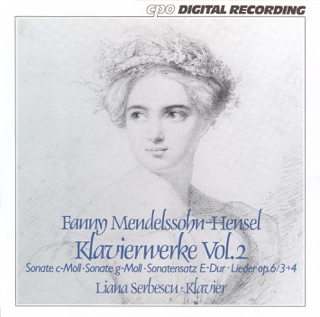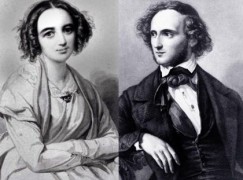Fanny Mendelssohn Lieder Best Recording

Please consider helping a needy family by providing an animal (or animals) that can forever alter a family's livelihood and means of sustenance. Heifer International is a phenomenal organization that improves the daily lives of impoverished families throughout the world by providing livestock for agricultural pursuits. This is made possible by the incredible generosity of people like you and me.
/ MENDELSSOHN-HENSEL / MAHLER, A.: Lieder BI 0738. Studio and Surround are all formatted in FLAC. Lossless is available in FLAC and ALAC (For Mac).
This is a gift that neither you nor its recipients will ever forget. As we measure the effects of the deteriorating global economy on our own lives, consider the impact plunging charitable contributions have on the lives of underprivileged, oppressed, and ignored people throughout the world.
Selected comparisons.Mendelssohn’s Songs Without Words may have suffered from their association with the Victorian parlour (just as his oratorios became indelibly linked with the amateur choral tradition) but, as these two new complete recordings remind us, they are a veritable treasure trove. Two German pianists, born a year apart, present quite different readings, with Matthias Kirschnereit offering a bonus in the form of a disc of Fanny Mendelssohn’s own ‘songs’ for piano.As countless pianists down the ages have proved, the Songs Without Words respond best to a non-sentimental approach, as witness artists as different temperamentally as Barenboim, Perahia and Perianes. If one were to generalise, Michael Endres is the more outgoing of the two, Kirschnereit more eager to internalise. Yet the latter is more of a colourist than Endres: in the third of Op 19, for example, with its hunting-horn calls and bounding energy, Endres sounds relatively monotone. But neither fully captures the half-lights of the mournful Op 19 No 6, so achingly conveyed by Perianes. In the opening number (marked Andante espressivo) of the second book, Op 30, both new versions are faster than the soulfully slow Barenboim. Yet what’s striking is that the Argentinian never sounds too slow, thanks to his finely tuned voicings, alongside which the desynchronised Kirschnereit seems somewhat gauche.
In the elfin Op 30 No 2, again it is Barenboim who bewitches. On the other hand, it is Perianes who seduces in the F sharp minor ‘Gondolier Song’ that closes the set, Endres sounding deliberate by comparison. However, there are times when Perianes can sound a touch fey – in the ‘Gondolier Song’, Op 62 No 5, for instance, where both Endres and Kirschnereit find a great directness of utterance.The fourth book, Op 53, is particularly delectable and Kirschnereit responds eagerly to the Presto agitato marking of the third number; Endres, while full of energy, is a little coarser in execution. And in the penultimate number of the set, Barenboim catches well its agitation, alongside which Endres seems a tad portentous. In the famous ‘Spinnerlied’ of Op 67, always a good testing ground, Endres comes across as a touch hard-edged in his left hand, but then Kirschnereit simply sounds too careful.
Fanny Mendelssohn Lieder Best Recording Album
Put on Rachmaninov, though, and all bets are off (I marginally prefer the clarity of the 1920 version over that of 1928, both available in his box of complete recordings – RCA).Though it will be clear that I have reservations about both sets, Kirschnereit’s addition of a disc of Fanny Mendelssohn is an enticing prospect. As the 19th-century critic Henry F Chorley pointed out, had she been ‘a poor man’s daughter, she would have been known throughout the world, alongside Frau Schumann and Madame Pleyel, as a female pianist of the highest order’. And highly regarded as a composer too. But Kirschnereit tends to underplay their drama (in the churning second number of Op 2, for instance), and the effect overall is emotionally tepid. Call of duty ui.


While he’s elegant in the first of Op 6, the climax of the second piece could have had more impact, while Op 8 No 2’s adventurous harmonic language passes for relatively little. The field is still wide open for a really first-rate recording of these piano pieces.